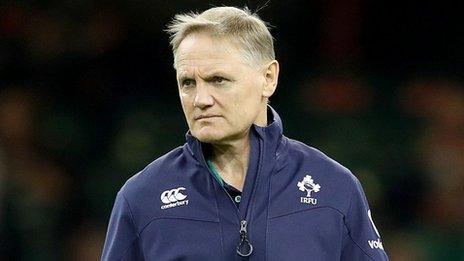Six Nations 2017: Little things that made a big difference in Wales v Ireland
- Published
It's an oft-repeated mantra during this Six Nations tournament that international rugby matches are decided by small margins.
There are 30 huge men on the pitch, many of them weighing north of 17 or 18 stones, battering seven bells out of each other for 80 minutes, yet the coaches insist it's the little things that make the difference.
They were at it again on Friday, Wales' smiling coach Rob Howley and his sharp, clear-talking Ireland counterpart Joe Schmidt.
A seething crowd of 74,500 witnessed Wales' redemptive 22-9 victory over Ireland in a thrilling, bruising, hide-behind-the-hands Test match in Cardiff.
And while Howley - under intense pressure in the build-up to the match - talked about how different the tournament would have been if little things had gone Wales' way in the 23-16 defeat by England, Schmidt smiled ruefully on how Ireland had been undone by minor incidents with a major impact.
Rory Best: Ireland let Wales off the hook
So what little things? Well here are four key moments from another epic Six Nations Friday in Cardiff.
Sexton's head assessment
Ireland were leading 3-0 and asking most of the questions when fly-half Johnny Sexton left the field for a head injury assessment after taking an accidental blow from Jonathan Davies.
With his temporary replacement Paddy Jackson still settling in to place, Wales attacked down the fly-half channel through Rhys Webb and Scott Williams to create the first of George North's two tries.
"It was very smart of Wales to attack down that channel and difficult for Paddy who had just come on," said Schmidt.
It was early in the match and gave Wales just a two-point advantage which Jackson quickly cancelled with a penalty, but it ignited the crowd and put a spring in the step of the Wales backs.
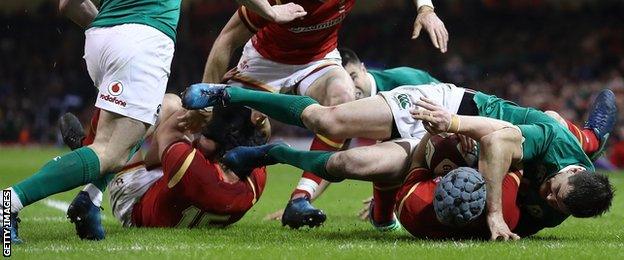
Johnny Sexton stops Jonathan Davies scoring in the incident that led to him being shown a yellow card
The yellow card
Schmidt pointed out after the game that Wales were penalised 10 times to Ireland's four, yet it was Johnny Sexton who saw yellow.
The key wasn't the crime itself but where it was committed - right on Ireland's try line with Wales attacking furiously.
Sexton marched off with minutes of the first half remaining and Wales trailing 6-5. By the time he returned Wales were leading 15-6 after Webb - again - had exploited Wales' extra man to give George North an unopposed run-in in the right corner.
"I felt Johnny was unlucky because he was pinned by three Welsh players, but in those areas and circumstances there's always a danger of a yellow," said Schmidt.
Howley felt Wales exploited the extra man well.
"The try down the short side in the second half was very smart," was the former Wales scrum-half's view.

At the bottom of the pile Jamie Roberts has scored Wales' third try after Taulupe Faletau's charge down
A tale of two charge downs
With Sexton orchestrating a siege on Wales' goal-line and the home team defending a six-point lead Dan Biggar had a clearance from the in-goal area charged down.
The deflection flew to prop Tadhg Furlong and straight through his fingers with the try line at his mercy. Wales scrambled the ball into touch and then survived a driving line-out.
Minutes later with Ireland eventually pinned back in their 22 and still trailing by six, Sexton's attempted chip was battered to the ground by Taulupe Faletau.
The ball ping-ponged briefly off some legs before finding its way into the grateful arms of Jamie Roberts who dragged the at-the-centre-of-everything Sexton over the line with him to score the match-clinching try.
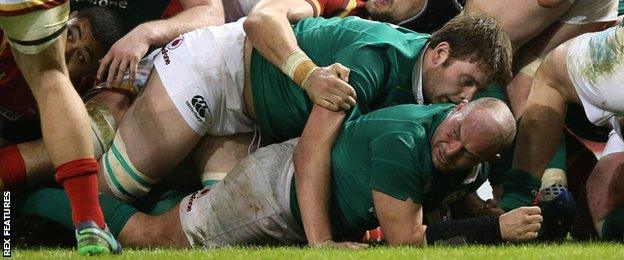
Rory Best has the ball down over the try line, but referee Wayne Barnes has bad news for Ireland
Henshaw gets it wrong in 'that' maul
But the key moment in the game involved an Irish driving line-out with some five minutes remaining.
Captain Rory Best had the ball under control and Ireland were making slow but steady progress towards the Wales try line before the maul was briefly halted.
Centre Robbie Henshaw's intervention added fresh trundle to the bundle of wrestling bodies and Best dropped over the Welsh try line with referee Wayne Barnes saying: "No Rory, I can't allow it."
Henshaw had entered the maul in front of Best, obstructing Welsh defenders and was penalised - a situation from which Wales eventually pinned Ireland back and claimed their decisive third try.
"If we score that it's in and around the 15-metre mark and you'd expect to convert it," said Schmidt.
"You go one point ahead and suddenly they're chasing the game and not us."
In commentary, former Ireland captain Paul O'Connell put it nicely in a probably unintentional rhyming couplet.
"If he puts his arm around Rory, it's a different story," he said.
And how!
Ireland could have been preparing for a championship showdown with England in Dublin while Wales would have been travelling to France trying to avoid their worst campaign since 2007.
Instead, Schmidt believes Ireland are playing for a place in the top half of the table while Wales are off to Paris with a spring in their step at last - a chorus of discontent replaced by cheers and back-slapping.
Little things. Major consequences. Altogether a big night out in Cardiff.
- Published10 March 2017
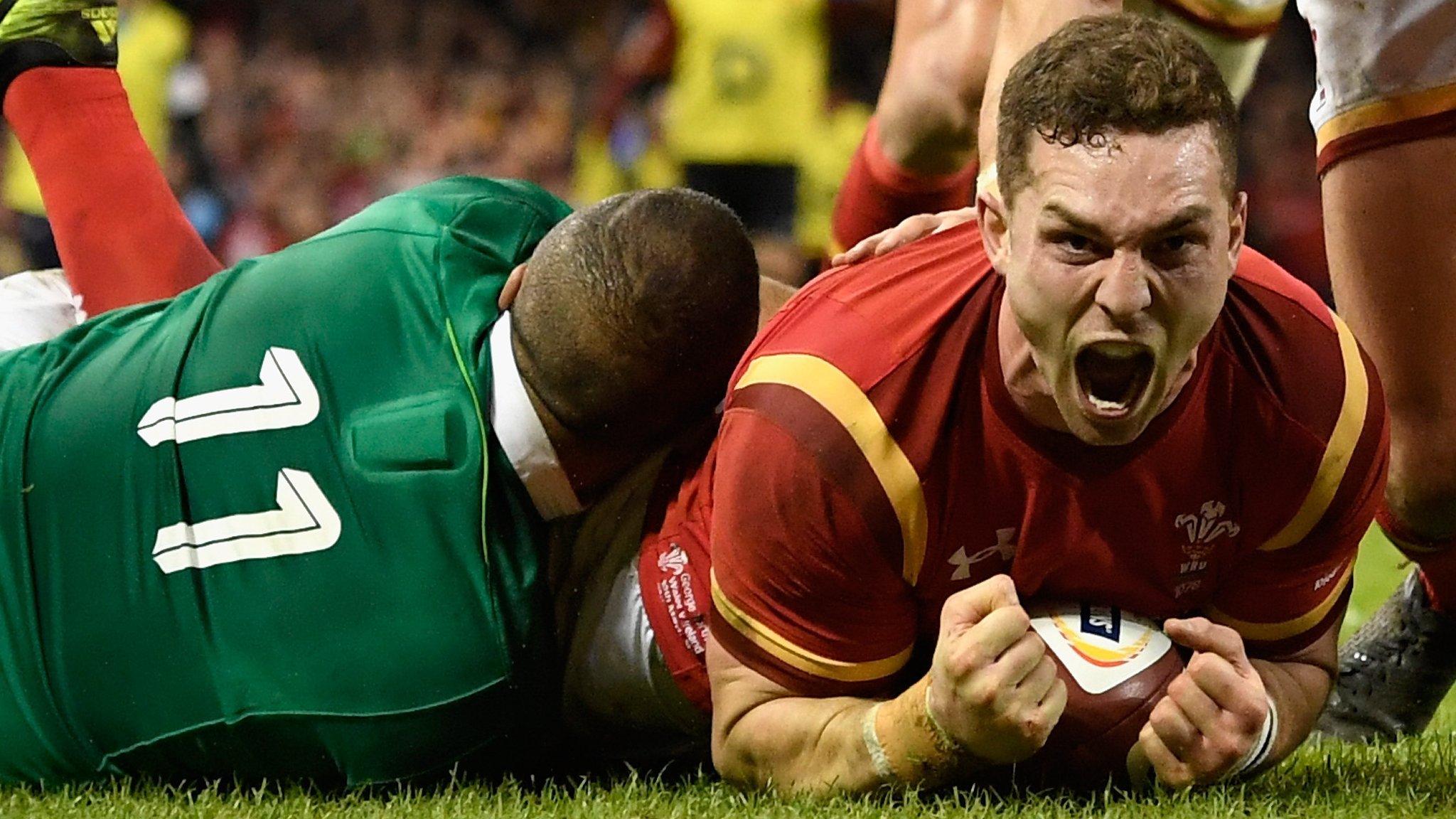
- Published10 March 2017
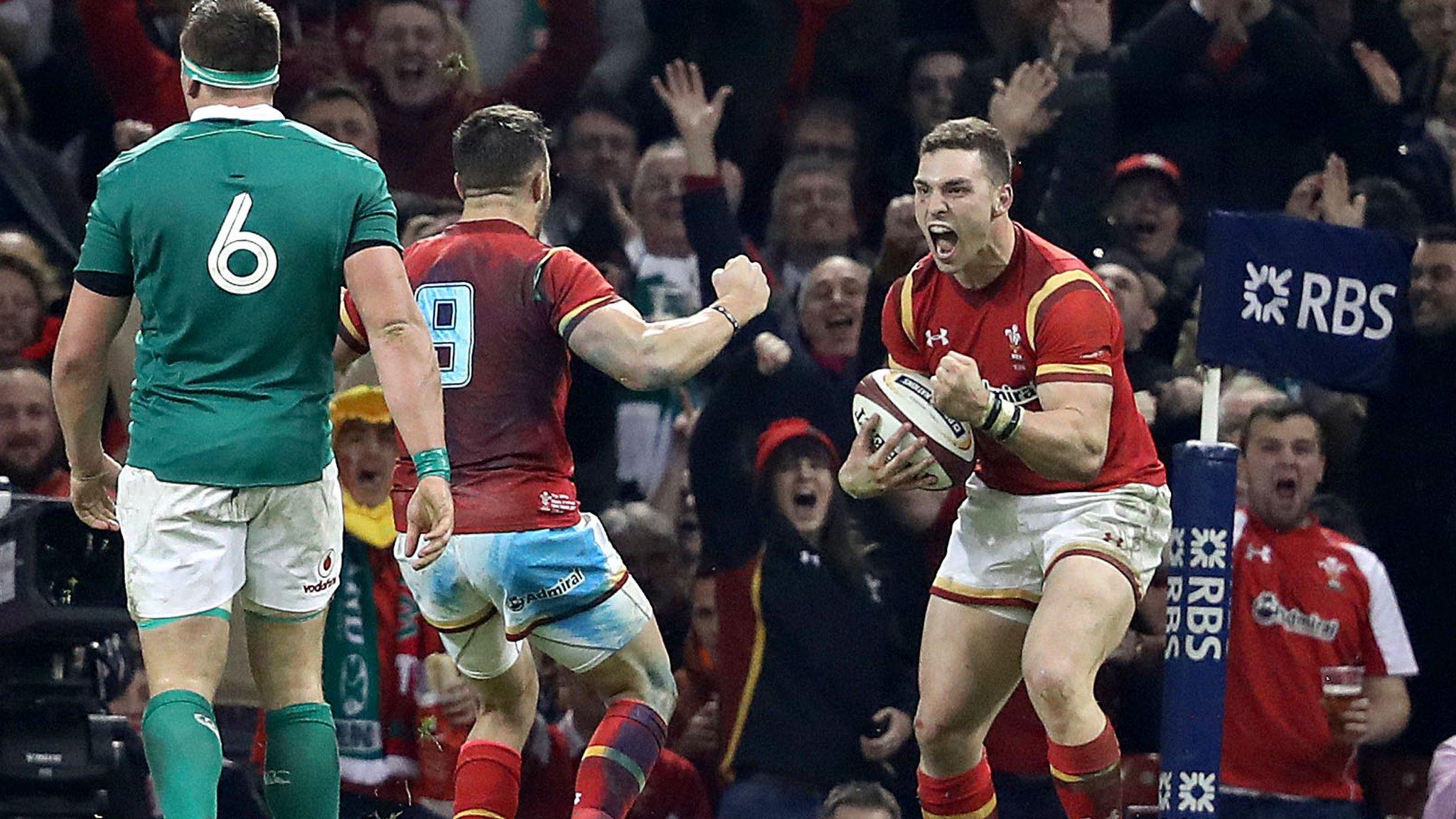
- Published10 March 2017
